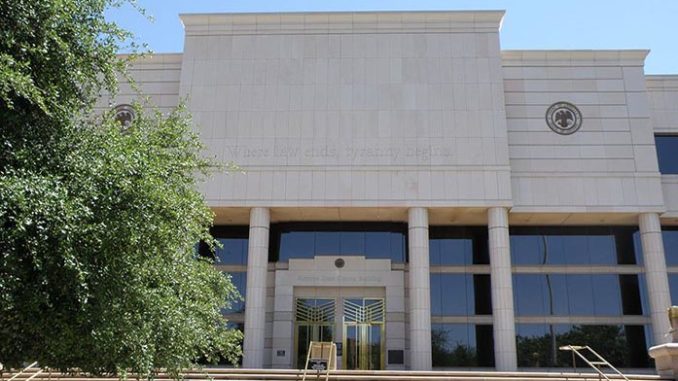By Corinne Murdock |
The Arizona Supreme Court convened on Tuesday to hear arguements in the case, Karen Fann, et al v State of Arizona, et al. In making their decision, the court will consider two main questions:
- Can Proposition 208 a statutory initiative, exempt itself from the expenditure limitations for school districts imposed by article IX, section 21 of the Arizona Constitution, and, if it cannot, would rational voters have adopted the Proposition’s tax knowing that its revenues could not be spent?
- Can the Proposition impose a new tax without a supermajority vote of both houses of the legislature, as required by article IX, section 22 of the Arizona Constitution?
Prop 208 was a statutory initiative that sought to become a constitutional amendment. The voter referendum proposed a new income tax of 3.5% on anyone who makes over $250,000 individually or anyone making $500,000 jointly in order to fund public education. The referendum passed on Election Day last year.
Plaintiffs’ attorney Dominic Draye with Greenberg Traurig asserted that the proposition has problems squaring up with the Arizona Constitution. Specifically, regarding its proposed spending patterns.
“It’s attempted to declare itself exempt from a portion of the constitution fails out of the gate. So its backers turn to the grant gift exemption,” stated Dray.
Attorney for the state Andy Gaona argued that the bill didn’t have problematic spending patterns. He said that the intent of Prop 208’s drafters was to provide “a permanent, dedicated funding source” for schools. Additionally, Gaona likened Prop 208 to other state funding.
“[It’s not unconstitutional in] the same way that there’s nothing inherently unconstitutional about state aid and state appropriations that may go towards the expenditure cap, that may ultimately cause the expenditure cap to be exceeded,” said Gaona. “In the same way there was nothing inherently unconstitutional about the fact that Prop 208 spending in a particular year may cause the expenditure cap to be exceeded. The truth is that, if there’s a conclusion that not only does the grant exception not apply [… then] there’s a process that’s in place already, and has been in place for years, that dictates how the expenditure cap will be dealt with.”
On behalf of the state, a spokesperson for the Arizona Department of Revenue explained to the judges that the anti-injunction act hasn’t ever been used in the contest of a personal income tax.
“Our research hasn’t revealed that the anti-injunction act hasn’t applied directly to a personal income tax issue, nor has there been any sort of ruling that the statute has been ineligible for application,” stated Bergen. “There is a bit of vacuum there. All instances of the law that we’ve seen have been applied to the context of property taxes.”
In closing, Draye reiterated that Prop 208 would be unconstitutional – partly for the expenditure limits outlined in the Arizona Constitution, but mainly for the reason that it imposes a new tax without legislative approval.
“The offending act is not the expenditure of funds in violation of the cap – I want to be clear about that. The thing that’s unconstitutional about this statute – well there are two things – there’s a section 22 part we haven’t talked about, which I think is fairly straightforward,” stated Draye. “The problem there is [that] a portion of the Arizona Constitution doesn’t apply to Prop 208. That has happened already – that is not true and will never be true.”
Draye said that Prop 208 invited taxes to be created by mob rule in the state.
“This is not a case where you have the legislature versus the people, or something like that. This is the people acting in their capacity as amenders of the Constitution to bind themselves so that bare majorities can’t grow the size of government and impose new taxes,” added Draye.
Immediately following the election, private citizens requested a temporary restraining order and a preliminary injunction to stop the tax. Groups including the Alliance Defending Freedom and the Goldwater Institute joined the suit.
The court promised to issue its ruling at a later date.
Corinne Murdock is a contributing reporter for AZ Free News. In her free time, she works on her books and podcasts. Follow her on Twitter, @CorinneMurdock or email tips to corinnejournalist@gmail.com.








